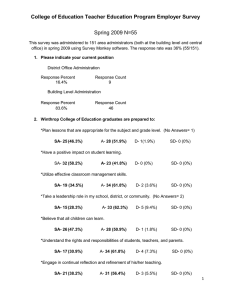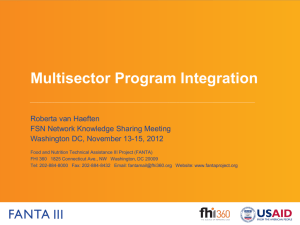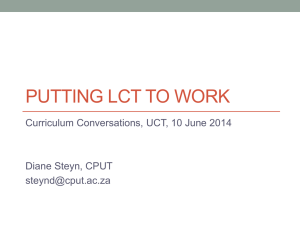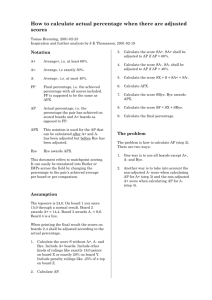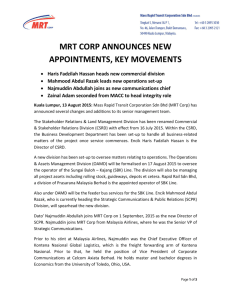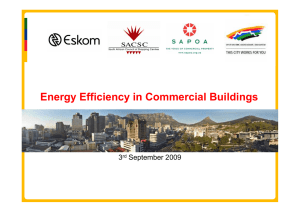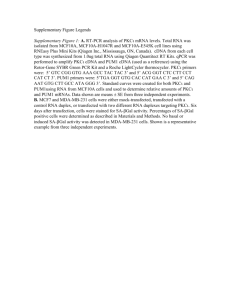Advanced Preparation Program Graduate Survey, 2010
advertisement
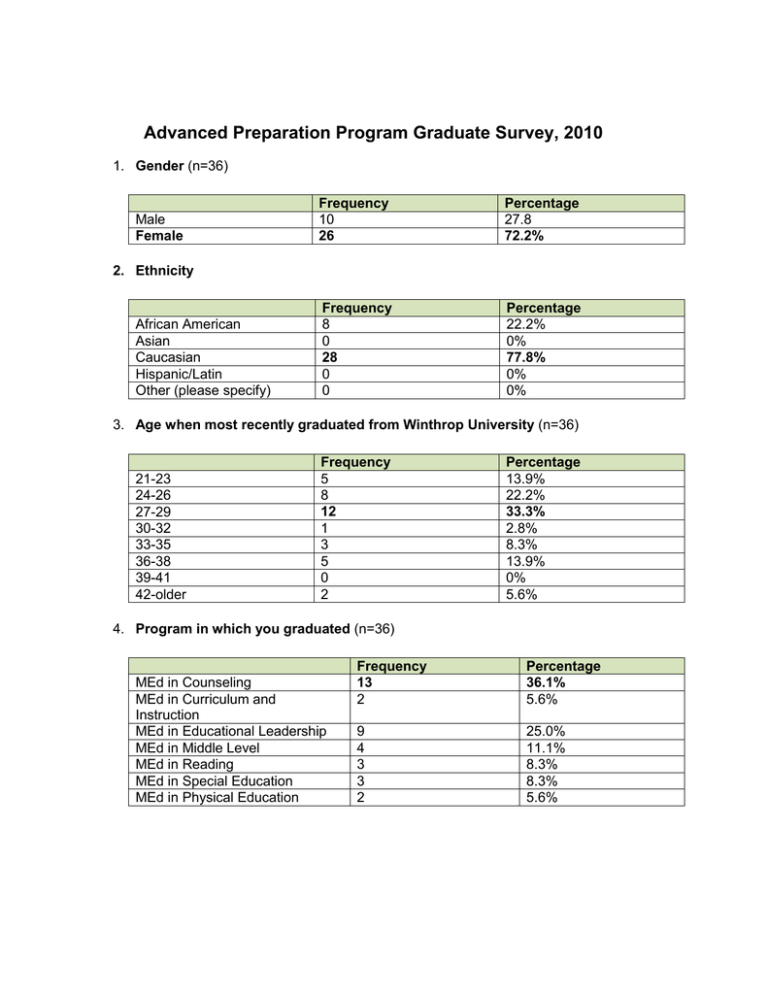
Advanced Preparation Program Graduate Survey, 2010 1. Gender (n=36) Male Female Frequency 10 26 Percentage 27.8 72.2% Frequency 8 0 28 0 0 Percentage 22.2% 0% 77.8% 0% 0% 2. Ethnicity African American Asian Caucasian Hispanic/Latin Other (please specify) 3. Age when most recently graduated from Winthrop University (n=36) 21-23 24-26 27-29 30-32 33-35 36-38 39-41 42-older Frequency 5 8 12 1 3 5 0 2 Percentage 13.9% 22.2% 33.3% 2.8% 8.3% 13.9% 0% 5.6% 4. Program in which you graduated (n=36) MEd in Counseling MEd in Curriculum and Instruction MEd in Educational Leadership MEd in Middle Level MEd in Reading MEd in Special Education MEd in Physical Education Frequency 13 2 Percentage 36.1% 5.6% 9 4 3 3 2 25.0% 11.1% 8.3% 8.3% 5.6% 5. Year you received your degree from Winthrop University (n=36) 2006 2007 2008 2009 2010 Frequency 13 11 5 7 0 Percentage 36.1% 30.6% 13.9% 19.4% 0.0% Frequency 5 8 2 1 Percentage 14.3% 22.9% 5.7% 2.9% 14 1 0 40.0% 2.9% 0.0% 4 11.4% 6. Current occupation (n=35) School Administrator School Counselor Agency Counselor Other Nonprofit Organization Teacher Wellness Director Athletic/Recreational Director Other (please specify) 7. State in which you are employed (n=32) North Carolina South Caroline Frequency 23 9 Percentage 71.9% 28.1% 8. Are you currently pursuing additional graduate coursework (n=36) Yes No Frequency 7 29 Percentage 19.4% 80.6% 9. If you answered yes to the question above, what is the name, location, and field of study in which you are enrolled (n=7) PhD in Human Services at Capella University online program Doctorial Program for School Administration University of South Carolina, Columbia, Social Foundations of Education University of Virginia, Charlottesville, VA, Counselor Education and Supervision Ph.D. The Citadel, Charleston, SC School Counseling Certification Doctoral Degree in School Administration or Superintendancy 10. The faculty in the program (n=36) *Were highly qualified for their positions SA- 25 (69%) A- 11 (31%) D- 0 (0.0%) SD- 0 (0.0%) NA- 0 (0.0%) *Presented current research and best practices in the field SA- 22 (61%) A- 14 (39%) D- SD- 0 (0.0%) NA- 0 (0.0%) *Used a variety of assessment strategies to evaluate learning SA- 23 (64%) A- 12 (33.3%) D- SD- 0 (0.0%) NA- 0 (0.0%) *Instilled a sense of ethical decision making SA- 28 (78%) A- 8 (22%) D- SD- 0 (0.0%) NA- 0 (0.0%) *Challenged me to grow intellectually and perform my best SA- 24 (69%) A- 11 (31%) D- SD- 0 (0.0%) NA- 0 (0.0%) 11. The graduate program at Winthrop that I completed prepared me to (n=36) *Be an effective instructional leader SA- 18 (50%) A- 15 (42%) D- 0 (0.0%) SD- 0 (0.0%) NA- 3 (8.0%) *Plan and implement effective instruction and/or counseling interventions SA- 23 (64%) A- 12 (33%) D- 2 (3.0%) SD- 0 (0.0%) NA- 0 (0.0%) *Work effectively with students or clients with disabilities SA- 16 (44%) A- 17 (47%) D- 2 (6.0%) SD- 0 (0.0%) NA- 1 (3.0%) *Work effectively with students or clients who have limited English proficiency SA- 7 (19%) A- 16 (44%) D- 10 (28%) SD- 0 (0.0%) NA- 3 (8.0%) *Work effectively with diverse groups of students or clients SA- 22 (61%) A- 13 (36%) D- 0 (0.0%) SD- 0 (0.0%) NA- 1 (3.0%) *Utilize technology in professional roles and functions SA- 16 (44%) A- 19 (53%) D- 0 (0.0%) SD- 0 (0.0%) NA- 0 (0.0%) *Communicate effectively with students/clients, families, and community members SA- 19 (53%) A- 17 (47%) D- 0 (0.0%) SD- 0 (0.0%) NA- 0 (0.0%) *Integrate knowledge and practice derived from research into my professional duties SA- 25 (71%) A- 9 (26%) D- 1 (3.0%) SD- 0 (0.0%) NA- 0 (0.0%) *Construct a supportive, well-managed, motivational learning or therapeutic environment SA- 24 (67%) A- 12 (33%) D- 0 (0.0%) SD- 0 (0.0%) NA- 0 (0.0%) *Meet the needs of my students/clients SA- 27 (75%) A- 9 (25%) D- 0 (0.0%) SD- 0 (0.0%) NA- 0 (0.0%) *Create an environment that supports student learning or client growth SA- 26 (72%) A- 10 (28%) D- 0 (0.0%) SD- 0 (0.0%) NA- 0 (0.0%) *Have a positive impact on student/client learning SA- 26 (72%) A- 10 (28%) D- 0 (0.0%) SD- 0 (0.0%) NA- 0 (0.0%) *Believe that all children/adults can learn SA- 29 (81%) A- 7 (19%) D- 0 (0.0%) SD- 0 (0.0%) NA- 0 (0.0%) *Understand the rights and responsibilities of students, clients, teachers, parents, and/or other constituents SA- 26 (72%) A- 10 (28%) D- 0 (0.0%) SD- 0 (0.0%) NA- 0 (0.0%) *Engage in continual reflection and refinement of my performance SA- 24 (67%) A- 12 (33%) D- 0 (0.0%) SD- 0 (0.0%) NA- 0 (0.0%) 12. List any honors you have received (n=12) Induction to National Association of Professional Women Lancaster County Teacher of the Year Chi Sigma Iota Mary Roland Griffin Graduate Scholarship National Board Young Adolescence in the area of Science National Boards At Winthrop: Annette Wells Shelley Scholarship, Winthrop Graduate Scholarship; At UVA: William Van Hoose Memorial Award N/A Certified mentor, NCC, NBCC candidate National Board Certification N/A N/A 13. What were the strengths of your degree program (n=27) The people...both the cohort and the professors. Dr Sanders and Dr Whiting were wonderful The program was well-rounded and provided me with opportunities to use the information I was learning in a leadership position through the tasks assigned. Internship Well balanced and practical program that prepared me well for my career as a school principal practical strategies and training that I can continually draw upon and a cohort approach Flexibility Counsel of peers and instructors; they were inspiring. Performance Based Assessment The professors were knowledgeable and dedicated to their jobs Availability and Personalities of the professors at the time: Dr. Sanders, Dr. Chauvin, Dr. Whiting, Dr. Briggs Application Constant communication with my professors and/or advisor. Professional and overall approachable professors The faculty. They not only worked extremely well together, but they each fulfilled a niche that the other two lacked. The faculty during my time at Winthrop were extraordinary (Johnny Sanders, Peggy Whiting, and Ida Chauvin). 2. The continual focus on practice. Even before we got to our Practicum and Internships, we had to do role plays and practice tapes in almost every class that prepared us for the "real thing," so that it was not so daunting when we got there. 3. My cohort. First of all, I cannot imagine going through such an intense program of study without a cohort model to provide support for each other. Second, my cohort was both diverse and cohesive, which made for a very satisfactory, fulfilling, and growth-producing experience. Weekend courses, night courses Dr. Sanders and Dr. Whiting Most helpful teaching strategy was role playing counseling scenarios and reviewing personal tapes of real counseling sessions. This gave practical and immediate feedback. It helped instill confidence to return in the field with better ideas and ways to handle situations. Building relationships, and counseling skills Taught me to effectively teach my students All courses were relevant for the most part. Teaching us how to find and use research to back up our ideas Small ratios, cohort model Research based practices were implemented and the course work was challenging The practice and reflection that was required Positive learning environment that prepared me for my new job Required internships; close mentorship with professors 14. What changes would you recommend for your degree program (n=26) Consideration of a PhD program at Winthrop University The program began to go through big staff changes near the end of my time there, so I'm not sure what stayed a constant and what changed More hands on experience in the classroom Not at this time None It needed a lot more organization and clarity. Exercise Science is a wonderful progression for the program. Conform the program to ACSM standards. Small group guided reading training in the MED READING and Fountas and Pinnel running record training I am not sure how another course would fit into the degree program, but more special education training is needed. None- it was well paced and planned out None Allow graduates to return to meet with students in M.Ed. in Educational Leadership to share current, "real world" experiences Provide more information about evidence based practice, since that's the direction the profession is hurtling toward. But I would suggest a balance between "treatment" models and more intuitive models of helping. For internships, more uniformity with respect to how students get placed. It would have been helpful for me to have information about what sites would be acceptable and how to go about securing a place. Also, more education about the nuances of supervision before supervision begins (e.g., some kind of orientation to what "supervision of counseling" means). These suggestions may be moot, however, since the program and the program faculty have completely changed since I was there. That you re-evaluate your acceptance of transfer credit. I had to take your DSM course, which was the exact same course I had taken at another university. I was told that I had to retake it b/c it was over 7 years old, but the course was the exact same, still using the DSM-IV, also had to take a group course again for the same reason, the course was over 7 years old, but it was the same course. The way you lead a group and the stages had not changed. Most of the profs I had have been replaced. I did not get any assignments back from one class I took. When I asked to see the graded assignments the reply I got was "why, you made an A in the class." The material I learned was relevant, but I was not impressed with one prof. When she was observed she did a great job, but most nights in class she would knit. Don't tell the profs you are coming in to observe them, do it unannounced. Not sure--it prepared me well. More instruction on dealing with parents and the community. I felt prepared to work with students in a school setting, but not prepared to work with parents or faculty at the school. Needs to address RTI and SIT more none, really Interaction between Gen Ed teachers/administrators and Sped teachers because lack of understanding seems to be a huge hindrance in the workplace. none, this was an awesome program! offer DSM-IV in the Spring or Fall versus only over the summer over the weekend. Professor at time enrolled was not prepared to teach course. A special education course N/A None at this time
